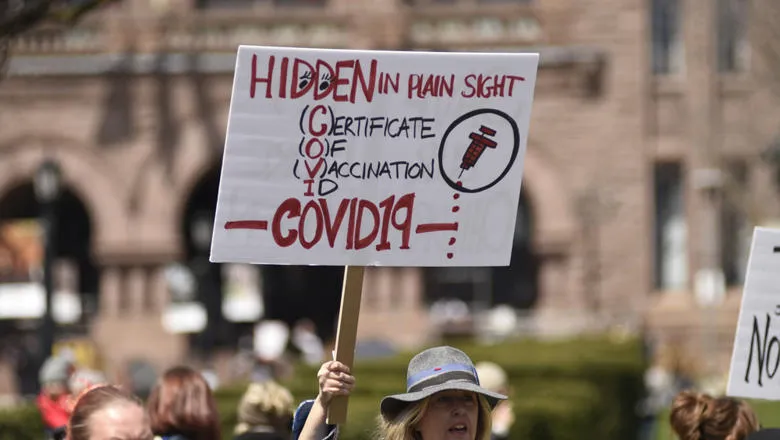In order to make good decisions, people need access to high-quality information – and unfortunately, the quality of medical information on social media has historically been much lower than the quality of medical information in major newspapers and on television. Social media companies have now started to take action against medical misinformation, but it remains to be seen whether they have done enough. It’s also vitally important that political leaders follow scientific advice and encourage ordinary citizens to do the same.’
Dr Daniel Allington, lead author of the article and Senior Lecturer in Social and Cultural Artificial Intelligence at King’s College London
09 April 2021
Covid-19 vaccine hesitancy linked to reliance on social media and voting for Trump
New research by King’s College London and the University of Bristol, published in the leading peer-reviewed journal Vaccine, published by Elsevier, has found a link between media use, voting history, and willingness to be vaccinated against SARS-CoV-2, the virus that causes Covid-19.

New research by King’s College London and the University of Bristol, published in the leading peer-reviewed journal Vaccine, published by Elsevier, has found a link between media use, voting history, and willingness to be vaccinated against SARS-CoV-2, the virus that causes Covid-19.
The researchers’ analysis was based on four separate representative sample surveys, two carried out in the United Kingdom and two carried out in the United States in summer 2020. In both countries, the researchers found that people’s willingness to be vaccinated was related not only to the media they use for information about coronavirus, but also to who they had voted for in the last presidential or general election:
- In the United States, intention to be vaccinated was higher among people who frequently check the mainstream media for information about Covid-19 and among people who voted for Hillary Clinton in 2016
- It was lower among people who voted for Donald Trump in 2016
- In the United Kingdom, intention to be vaccinated was higher among people who frequently check the mainstream media for information about Covid-19 and among people who voted Labour in 2019
- It was lower among people who say that a lot of their information about the coronavirus comes from social media
The researchers also looked at the importance of age, gender, education, ethnicity, and household income:
- In the United States, intention to be vaccinated was lower among women, less-highly educated people, members of non-white ethnic groups, and people living in low-income households
- In the United Kingdom, intention to be vaccinated was lower among young people, members of other-than-white ethnic groups, and people living in low-income households
These findings are highly statistically-significant, meaning there is high confidence that they are not the result of chance. The form of analysis used also involves controlling for a range of variables, allowing the researchers to rule out the possibility that the differences associated with social media and voting history can be explained by age, gender, education, ethnicity, or household income.
Dr Siobhan McAndrew, principal investigator of the research project and Senior Lecturer in Sociology with Quantitative Methods at the University of Bristol, said:
‘We know that the coronavirus vaccination programme is a long game. Younger people in particular are both less likely to perceive a personal risk and also to be more engaged online. Policy-makers and health communicators need to pay attention to their needs, and we must all be aware of how critical their involvement is for successful delivery of the vaccination programme.’
Dr Vivienne Moxham-Hall, a Research Associate at the Policy Institute at King’s College London with a background in immunology and health policy, said:
‘This speaks to the influence of political figures in people’s perceptions around vaccination and the realities of coronavirus. There is a message here for the media as well as for politicians around the role they may be playing in amplifying misinformation.’

